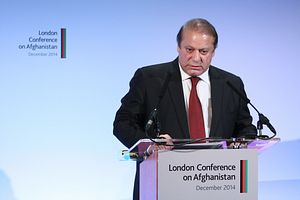The Pakistan Supreme Court’s ruling that disqualification under Article 62 (1)(f) of the constitution is for life, which means a lifetime ban from parliament for ousted Prime Minister Nawaz Sharif, wasn’t the slightest bit surprising.
For starters, the pretext for Sharif’s ouster on July 28, 2017 – not over the many corruption charges against him but for the failure to disclose unwithdrawn receivables – meant he was proven as a “dishonest” man.
Article 62 (1)(f) of Pakistan’s Constitution reads:
A person shall not be qualified to be elected or chosen as a member of Majlis-e-Shoora (Parliament) unless he is sagacious, righteous and non-profligate, honest and ameen, there being no declaration to the contrary by a court of law.
This is a part of the “Sadiq and Ameen” (truthful and honest) clauses, which were added to Articles 62 and 63 under the military dictatorship of Zia-ul-Haq to set Islam-tinted character certificates as prerequisites to become a parliamentarian. These clauses can be triggered to disqualify anyone who does not live up to the impossible standards.
And since unlike Article 63, Article 62 does not specify the duration of the disqualification, the Supreme Court only had to strike its hammer on the nail that was designed as the seal for political coffins over three decades ago.
Therefore the verdict, which appears to have ended Nawaz Sharif’s political career, adjudicates that the former three-time prime minister is to be barred from ever taking up public office again for not taking money from his son’s company, for it proves that he is a dishonest man – as per the Islamic criteria laid out in the Constitution.
And to add insult to injury the decision was announced without the apex court mentioning the name “Nawaz Sharif” even once – for, the case was to decide the duration of disqualification under Article 62 (1)(f), and was not directly a verdict on his political future.
Even so, the fact that a unanimous verdict was announced by a five-member bench, when there was at the very least grounds for the decision to go the other way, underscores exactly who it was aimed against.
Also, considering that at least 17 cases pertaining to disqualifications under Article 62 (1)(f) have been pending in recent years, the timing of the verdict also drives home the point.
There remains little doubt that Nawaz Sharif’s dismissal – its means more than the actual end – is a de facto judicial coup. The Lahore High Court ordering the Pakistan Electronic Media Regulatory Authority (PEMRA) to stop broadcasting Sharif’s speeches “against the judiciary” also reaffirms the institutionalization of this tussle which has scratched off the democratic façade in the country.
This is no large scale anti-corruption drive taken up by the chief justice of Pakistan, whose aggressive overreach and political sloganeering has gone way beyond jurisdiction of merely interpreting the country’s law. Had accountability been a factor in the judiciary’s overreach into politics it would’ve put its own institution on the anvil or showed even the mildest interests in the Pakistan Army’s rampant corruption, scams, or seven decades’ worth of periodical treason.
This treason, which was symbolized by Pervez Musharraf becoming the first Pakistani army chief to be prosecuted for suspending the Constitution, is now evidently being replicated by other institutions, which are hell bent on similarly subjugating parliamentary supremacy.
Indeed it was the civilian government’s audacity to hold a former Army Chief accountable that has been a factor in the ongoing witch hunt under the auspices of the judiciary, which self-identifies as a quest for “accountability for all” without nary a tinge of irony.
Of course, none of this is to take away the parliamentarians themselves undermining their supremacy by self-attaching the puppeteers’ strings to their backsides, in their own lust for power. For instance, the fact that the Articles 62 and 63 haven’t been amended after over three decades, with Nawaz Sharif and his party having upheld them for political gains in the past, means that Sadiq and Ameen have come home to roost for Sharif.
Even so, as long as actual clout remains with the all-powerful military establishment, with the judiciary now completing the double whammy, the onus for suppressing parliamentary authority, and in turn the electoral power of the masses, would rest with them.
Therefore, while the verdict against Nawaz Sharif – and his possible exit from Pakistani politics – should be a lesson for those cheering the decision inside the Parliament that he has been disqualified from, the responsibility for denying the people their basic right to decide their fate rests with the two de facto supreme institutions of Pakistan.

































